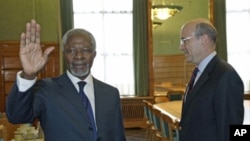The crisis in Syria is topping the agenda at the United Nations Human Rights Council, which began a month-long session Monday in Geneva. The session is expected to produce condemnation of the Syrian government's bombardment on civilians during its crackdown on dissent.
The president of the Human Rights Council, Laura Lasserre Dupuy, kicked off the proceedings by announcing that an urgent session focusing on Syria will take place on Tuesday. She speaks through an interpreter:
“In the light of the escalating grave human rights violations and the deteriorating humanitarian situation in the Syrian Arab Republic, I have had consultations with the extended bureau… on the practical details… in order to have a constructive debate on this topic,” said Dupuy.
Syria's ally Russia tried to get the debate postponed. But the Russian ambassador later said the meeting could go ahead, provided it takes place in a de-politicized manner and without written accounts.
Iran objected to the emergency session on Syria. But since Iran is an observer state in the rights council, its objection has no weight.
The president of the U.N. General Assembly said the government siege in Syria must end.
“Before arriving in Geneva, I visited a number of countries for deliberations with heads of state and governments, where the Syrian crisis was the highest concern discussed due to the flagrant violations against civilians. However, strong will and the necessary momentum are available to continue all efforts for saving lives and protecting Syrian civilians from the authorities’… oppression,” said Nassir Abdulaziz Al-Nasser through an interpreter.
The U.S. ambassador to the rights council, Eileen Chamberlain Donahoe, said Syrian President Bashar al-Assad is being increasingly isolated. She said the international community, however, is continuing to struggle over how to further pressure Assad.
“The international community is struggling with this topic and I am not going to tell you we have a silver bullet here. I can say we are looking to the leadership of the Arab League as one vehicle and secondly, we are working very hard to convince the other members of the international community, who are choosing for whatever reason to continue to support the Assad regime that they are making the wrong choice,” she said.
Donahoe also said Russia and China, which vetoed resolutions at the U.N. Security Council aimed at tougher actions on Syria, do not have veto powers at this forum.
| Join the conversation on our social journalism site - Middle East Voices. Follow our Middle East reports on Twitter and discuss them on our Facebook page. |





